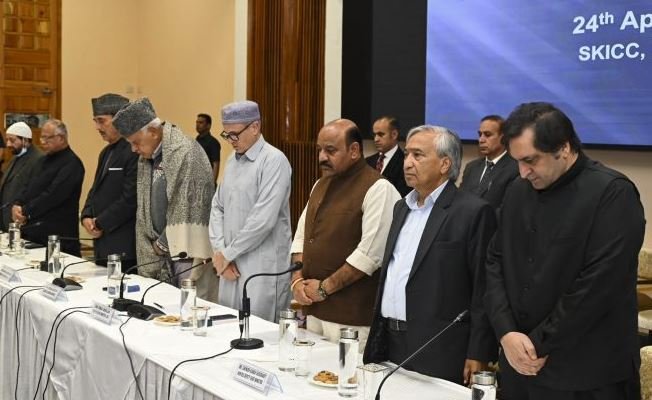The serene valleys of Pahalgam, usually echoing with the laughter of tourists and the gentle clatter of pony hooves, now bear the weight of an unspeakable tragedy. The terror attack that ripped through Baisaran’s idyllic landscape, claiming 26 innocent lives—most of them visitors seeking solace in Kashmir’s beauty—has left not just a region but an entire nation in mourning. The attack was not just on the individuals who lost their lives or the families torn apart—it was an assault on the very spirit of Kashmiriyat, the idea of India, and the essence of peaceful coexistence that has long defined the Valley in its most cherished form. Yet, amidst this deep and widespread grief, what emerged on the political front was something rare but necessary—a united and unequivocal stance by all political parties of Jammu and Kashmir. Amidst sorrow’s shadow, Omar Abdullah wove unity from tragedy’s threads, gathering rival voices into a harmonious chorus. The meeting bloomed like a lotus in murky waters – where grief’s weight transformed into governance’s grace. Political divides dissolved like morning mist, revealing Kashmir’s enduring spirit: resilient, compassionate, and radiantly whole. The resolution that was adopted did not merely offer ceremonial condemnation; it articulated, in strong and thoughtful terms, the collective will to stand against terror, uphold communal harmony, and shield the vulnerable from the contagion of hate and reprisal.
But beyond tribute and condemnation, the resolution ventured into a space that many such declarations fail to enter—it called for accountability, responsibility, and nationwide solidarity. It urged states and union territories to protect Kashmiris from any backlash that might befall them in the aftermath of the incident and to resist the tide of suspicion that often unfairly follows terror attacks. In doing so, the resolution reminded the country of a truth we too often forget: victims of terror are not just those who die in its fire but also those who live in its shadow. This appeal to protect Kashmiri citizens, students, and workers across India was not only timely but humane. In times of national crisis, especially when narratives are hijacked by polarizing elements, the importance of such balanced and moral clarity cannot be overstated. It is through these words and such unified action that the foundation of civic peace can be rebuilt. In a region often marred by political polarization and ideological divides, the language of this resolution was both healing and inspiring. It recognized the pain of the families who lost loved ones. It honoured the sacrifice of Shaheed Syed Adil Hussain Shah, the ponywallah who, in a moment of immense courage, stood between terrorists and the tourists he was ferrying, ultimately giving his life in an act that embodies the very meaning of heroism. His name will now live on in the memory of a nation that still dares to hope in the face of tragedy. The resolution also highlighted the need to preserve Kashmir’s social fabric through communal harmony, mutual respect, and the rejection of those who attempt to sow discord. The spontaneous, peaceful demonstrations across villages and towns in the Valley, following the attack, underscored that the people of Kashmir remain committed to peace, despite the provocations of violence. Perhaps the most powerful message of the resolution is that terror can never extinguish the spirit of a people who continue to stand together. It speaks to a deeper philosophy—that unity is not forged in calm waters but in the storms we weather together. When politics becomes a tool for healing and not division, when governments speak with one voice for justice rather than jousting over blame, when society refuses to let terror redefine who we are—that is when a democracy truly matures. Jammu and Kashmir has shown the country a model of what it means to respond to terror not just with security measures, but with societal cohesion. It is now up to the rest of the nation to echo this sentiment, to amplify this maturity, and to ensure that the memory of the lives lost in Pahalgam becomes a turning point, not another tragic footnote.
Let the legacy of this resolution be more than words. Let it be a call to action for administrators, civil society, and the media alike to safeguard the principles that bind us. In this moment of shared sorrow, Jammu and Kashmir has offered a blueprint for what responsible political action can look like, how national unity can be forged through empathy, and how civic peace can be preserved even in the darkest hours. The challenge now is not just to follow that path, but to walk it together. As the scent of pine lingers over Pahalgam’s grieving valleys, let it carry with it a promise: that courage will outlast fear, unity will outshine division, and Kashmir’s indomitable spirit will forever be the heartbeat of a nation that refuses to be broken. This is not just crisis management—it’s statesmanship at its finest, reminding the nation that when we stand together, no force of hatred can dim the light of our shared humanity.




